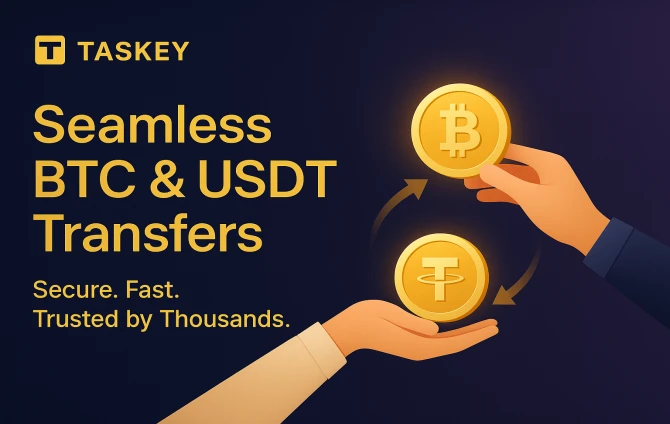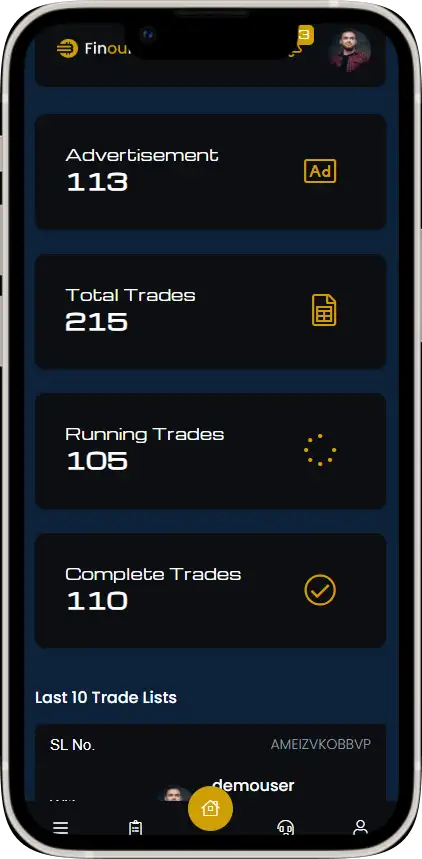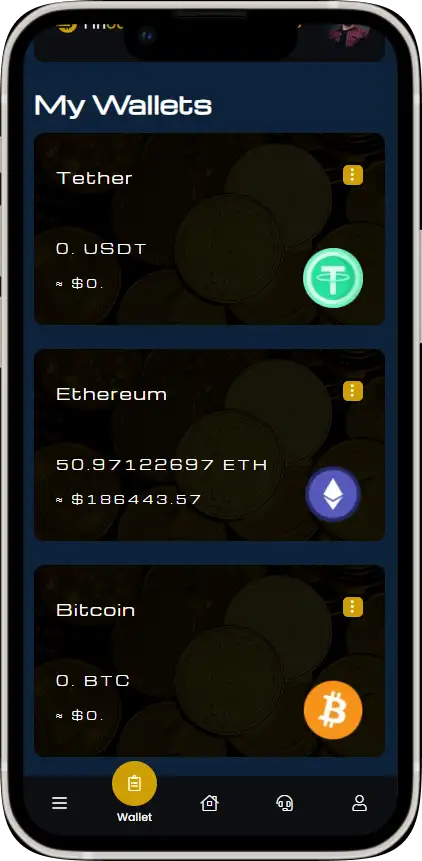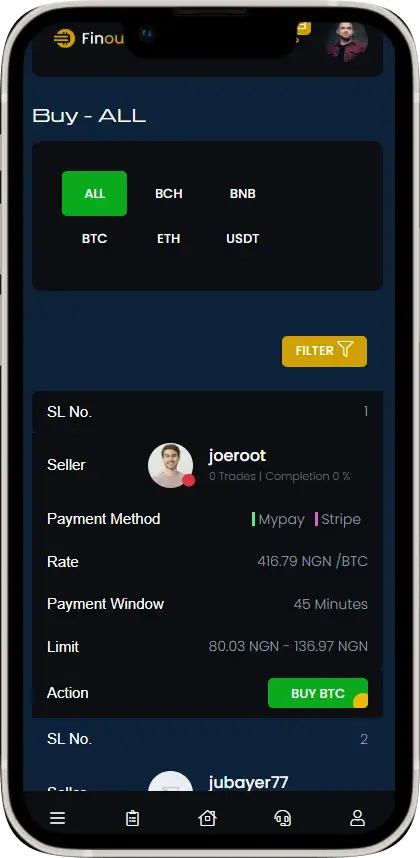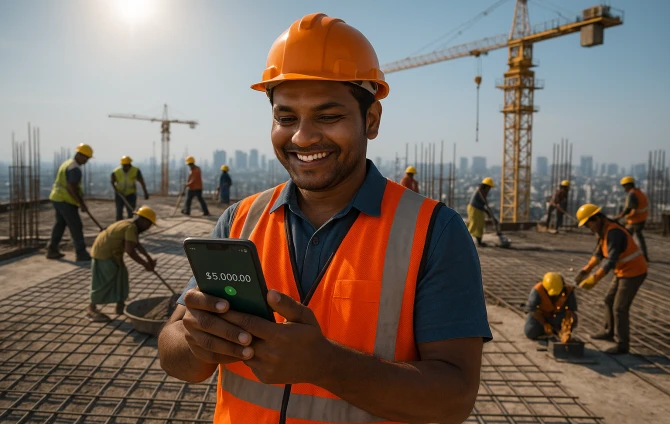
Skyscraper Dreams: How One Rooftop Worker Earned $5,000 That Changed His Life
The Heat and the Height
It was nearly noon, and the blazing sun hovered directly over Dhaka. The 15-floor building project on Mirpur Road was humming with energy—saws grinding, steel rods clanging, concrete being poured—and amidst it all, Fahim, a 30-year-old construction worker from the village of Barisal, moved with precision.
He was assigned to the rooftop team—one of the most dangerous and physically demanding parts of the site. Every step he took was calculated, every hand movement deliberate. With no safety nets, just hard hats and experience, he balanced steel and sweat at 150 feet above ground.
A Ping in the Wind
As Fahim was tightening a rebar, his cheap Android smartphone buzzed in his breast pocket.
He paused.
Cell reception that high wasn’t always stable. He pulled the phone out, expecting a missed call or maybe a data alert.
Instead, the screen displayed a balance update from his wallet app:
"$5,000.00 Received - TRC20 Wallet"
He blinked.
His eyes widened.
His hands trembled.
The concrete dust didn’t matter anymore. He dropped the spanner gently, sat on a cement bag, and just stared at the screen.
The Origin of the Funds
The money came from Tariq Bhai, a contractor from the UAE, who had employed hundreds of workers from Bangladesh remotely for high-rise prefabricated panel installations.
Fahim had been part of a blockchain-based labor network called “BlockWork”, where his attendance, output, and work hours were tracked via a decentralized app. Every hour worked earned micro-credits, and once the job was verified by the supervisor, it converted to USDT.
He hadn’t checked in a while.
And now, his cumulative 6-month labor—validated, recorded, and honored—was reflected as $5,000 worth of digital currency. Instantly, borderlessly.
Flashbacks of Struggle
Fahim’s life hadn’t always included numbers like that. In fact, there were times when even 500 taka was hard to come by.
He lost his father at 17 and became the sole breadwinner for a mother, sister, and twin nephews. He started working at construction sites locally, earning only 300–400 taka per day. But in recent years, he’d learned about crypto-based labor tracking and convinced a site engineer to sign him up.
He worked days, studied nights. Asked questions others didn’t. When he wasn’t mixing concrete, he was learning to install MetaMask.
Many laughed.
Some scoffed.
But Fahim waited.
And the wait, that day on the rooftop, turned golden.
Word Spreads
“Bhai, what happened?” asked Nasima Apa, a fellow female worker, noticing Fahim’s glowing face.
He turned the screen to her.
“Five thousand.”
“Dollar?!”
“USDT.”
Within minutes, the news had spread across the rooftop. Phones came out. Questions poured in:
-
“Ki bhabe paisa ashe?”
-
“Amrao ki korte pari?”
-
“Eta bhalo naki risky?”
The construction site turned into an informal crypto seminar.
A Visit from the Supervisor
Later that day, Engineer Imran, site supervisor, approached Fahim.
“I heard you got paid via USDT.”
“Yes, Sir.”
“I want you to train 15 more workers. Starting next week.”
Fahim was stunned.
“Train them?”
“Yes. We’ll be shifting 40% of our workforce to BlockWork system. And we need someone from the inside who knows how this works. You’ll get a bonus for it too.”
Fahim couldn’t believe it. From daily laborer to mentor?
Was this really happening?
Buying the Dream
With $5,000 in his digital wallet, Fahim converted $1,200 to BDT via P2P (peer-to-peer) on Binance. He bought a new feature phone for his mother, a school bag and tablets for his nephews, and a gold earring for his sister’s wedding.
He didn’t go overboard. He had a plan.
The rest he kept in USDT—to grow, to save, to one day build his own home.
He even opened an Excel sheet to start budgeting. A construction worker who once worked with bricks now calculated yields, DeFi returns, and compound interest.
Creating the Change
Over the next two months, Fahim trained 37 workers—men and women. He made guides in Bengali, printed screenshots, gave demos on Trust Wallet, and even conducted night classes under a makeshift light in the storeroom.
He was no longer just a "mistri"—he was now Fahim Sir.
One worker, a woman named Rina, used the payment system to help her son go to college. Another, Habib, used it to buy insulin for his diabetic wife without waiting weeks for bank transfers.
Blockchain wasn’t just tech here. It was lifesaving.
Invitation to Speak
Three months later, an email came:
“Dear Mr. Fahim,
We are inviting you to speak at the Blockchain for Builders forum in Kuala Lumpur.
We will arrange your travel and stay.
Regards,
Global Builders Network”
He read it five times. Was this spam?
No.
It was real.
In five months, he went from a sweaty rooftop to an international stage.
Speaking to the World
Wearing a borrowed blazer and a buttoned shirt, Fahim stood on a platform with his name tag:
“Fahim Rahman – Blockchain Beneficiary / Worker Advocate”
He shared his story to a crowd of investors, regulators, and NGO reps.
He didn’t use buzzwords.
He didn’t quote whitepapers.
He just told them about a day on a roof, about a dusty phone, and the message: "$5,000.00 received."
The audience stood up and clapped.
Lessons from the Sky
Fahim’s journey isn’t just about crypto or money. It’s about:
-
Empowering laborers with tools that honor their work
-
Reducing intermediaries who delay or dilute payment
-
Making the digital economy accessible to real-world hands
He didn’t learn finance in school.
He learned it while mixing cement and checking notifications.
💡 Final Reflection
From the dusty heights of an unfinished building to a global summit stage, Fahim proved that:
-
Work deserves dignity
-
Technology must empower
-
Blockchain can bridge worlds
He was never just a number in a ledger.
He was, and always will be, the man who smiled on a rooftop holding $5,000.


